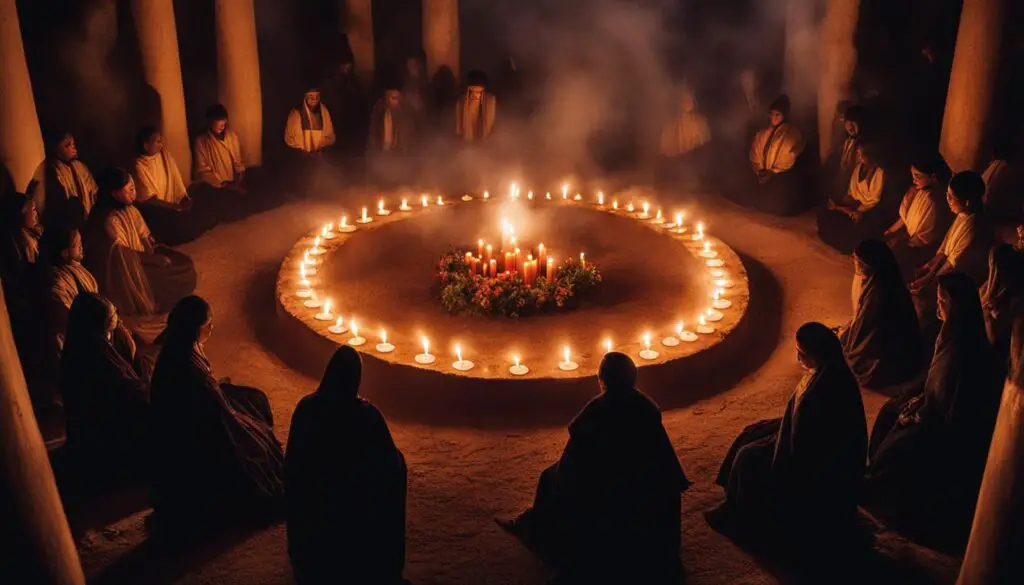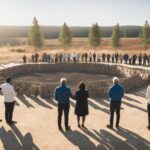Welcome to our comprehensive guide on unlocking your spiritual gifts. In this journey of self-discovery, you have the opportunity to tap into your divine talents and unleash your true potential. Whether you believe in spiritual gifts, divine talents, or spiritual abilities, this guide will provide you with insights and practices to help you unlock and develop them.
Throughout history, different cultures and religious traditions have recognized the existence of spiritual gifts. From ancient texts to modern teachings, the concept of these gifts has been intertwined with beliefs, practices, and rituals. By understanding their history, exploring the various beliefs and doctrines surrounding them, and engaging in sacred practices, you can deepen your understanding and connection to your spiritual gifts.
Leadership and clergy within religious communities often play a role in guiding individuals in recognizing and utilizing their unique gifts. Furthermore, worship practices and rituals provide spaces and opportunities to activate and enhance these abilities. Through prayer, meditation, and communal rituals, you can tap into your spiritual gifts and connect more deeply with the divine.
As you embark on this journey, sacred texts serve as a valuable source of guidance and inspiration. These texts offer stories, teachings, and examples of individuals who used their spiritual gifts for the betterment of themselves and others. Additionally, various denominations and sects within religious traditions may have different perspectives and practices when it comes to spiritual gifts, and understanding these differences can broaden your knowledge and perspective.
Community and outreach also play a vital role in the context of spiritual gifts. By using your gifts to serve others and contribute to the community, you can make a positive impact and embody the message of love and compassion.
Architectural and artistic features within religious spaces often symbolize spiritual gifts, reminding individuals of their innate talents and abilities. The visual representations of these gifts can inspire and deepen one’s connection to the divine.
Finally, it is important to acknowledge the contemporary issues and challenges surrounding spiritual gifts. These debates and controversies arise as people grapple with the authenticity, interpretation, and utilization of these gifts in a modern context. By remaining open-minded and seeking wisdom, you can navigate these challenges and continue on your path of unlocking your spiritual gifts.
Key Takeaways:
- Engage in self-reflection, spiritual practices, and growth exercises to unlock your spiritual gifts.
- Practice meditation and mindfulness to tap into your inner resources and connect with the divine.
- Seek guidance from mentors and cultivate a supportive environment to foster the development of your gifts.
- Recognize the historical and cultural origins of spiritual gifts and their presence in various religious traditions.
- Understand the different beliefs and doctrines related to spiritual gifts within religious and spiritual communities.
History and Origins of Spiritual Gifts
The history and origins of spiritual gifts can be traced back to various religious traditions and belief systems. Throughout history, different cultures have recognized the existence of spiritual abilities and divine talents. These extraordinary gifts have been mentioned and celebrated in ancient texts, teachings, and practices.
From the mystical traditions of ancient Egypt to the philosophical teachings of ancient Greece, spiritual gifts have been acknowledged and revered. In Egyptian mythology, the god Thoth was believed to possess the gift of wisdom and knowledge. In Greek philosophy, the concept of “genius” referred to a divine spirit that inspired individuals with exceptional talent and creativity.

“The highest wisdom and the highest genius ensure you glory, immortality, and what is more than either, the love and gratitude of the present and future ages.” – John Adams
In religious traditions such as Christianity, Judaism, Islam, Hinduism, and Buddhism, spiritual gifts play significant roles. These gifts are often seen as blessings bestowed by God or higher powers, meant to be used for the betterment of individuals and society. Biblical texts, like the New Testament, mention spiritual gifts as manifestations of the Holy Spirit, given for the common good and the edification of believers.
| Religion | Text | Reference |
|---|---|---|
| Christianity | 1 Corinthians | 1 Corinthians 12:8-10 |
| Judaism | Talmud | Sanhedrin 93a |
| Islam | Qur’an | Surah Al-Baqarah 2:251 |
| Hinduism | Mahabharata | Volume 1, Book 3, Section 90 |
| Buddhism | Pali Canon | AN 5.159 |
These historical and religious perspectives highlight the universality of spiritual gifts and the diverse ways they have been valued and interpreted throughout time. The recognition and exploration of spiritual gifts have continued to evolve, shaping the beliefs and practices of various denominations, sects, and spiritual communities.
Beliefs and Doctrines Related to Spiritual Gifts
Beliefs and doctrines surrounding spiritual gifts differ across various religious and spiritual traditions. While these beliefs may vary, they all acknowledge the existence of spiritual gifts and their significance in personal growth and spiritual practices.
In some religious traditions, spiritual gifts are regarded as supernatural endowments bestowed upon individuals by God or higher powers. These gifts are seen as divine blessings that enable individuals to carry out specific tasks and fulfill their spiritual purpose.
On the other hand, other traditions view spiritual gifts as inherent abilities that can be developed and nurtured through spiritual practices and personal growth. These doctrines emphasize the idea that everyone possesses unique talents and that tapping into these gifts requires self-discovery and cultivation.
“Spiritual gifts are a reflection of our inherent connection to the divine and the potential within each of us to contribute to the greater good.” – Reverend Sarah Thompson
Both approaches recognize the transformative power of spiritual gifts and their role in establishing a deeper connection with the divine. Whether perceived as supernatural endowments or innate abilities, spiritual gifts serve as a catalyst for personal and spiritual development.
Exploring Biblical Teachings on Spiritual Gifts
In Christian theology, the concept of spiritual gifts finds its roots in the Bible. The Apostle Paul, in his letters to early Christian communities, discusses the diversity of spiritual gifts and their purpose in building a strong and unified faith community.
One of the key passages on spiritual gifts is found in 1 Corinthians 12, where Paul highlights the importance of each individual’s unique contribution to the body of Christ. He emphasizes that spiritual gifts are imparted by the Holy Spirit and are intended to be used for the common good.
Paul lists various spiritual gifts, including wisdom, knowledge, faith, healing, prophecy, discernment, and speaking in tongues. These gifts are seen as manifestations of the Holy Spirit’s work in the lives of believers.
Throughout the Bible, spiritual gifts are portrayed as essential tools for serving others and advancing the Kingdom of God. They are not only meant for personal benefit but also for the betterment of the community and the fulfillment of God’s purposes.
| Scripture Passage | Significance |
|---|---|
| 1 Corinthians 12:4-11 | Emphasizes the diversity and interdependency of spiritual gifts within the body of Christ. |
| Ephesians 4:11-13 | Highlights the purpose of spiritual gifts in equipping believers for ministry and building up the church. |
| Romans 12:6-8 | Provides a list of spiritual gifts and their respective functions in the body of Christ. |
These biblical teachings guide believers in understanding the significance of spiritual gifts and their role in fulfilling God’s purposes. They serve as a foundation for doctrinal beliefs and shape the practices and expressions of spiritual gifts within different religious communities.

As individuals explore their beliefs and doctrines surrounding spiritual gifts, they may find inspiration from sacred texts, spiritual leaders, and the shared experiences of others within their religious community. The journey to understanding and unleashing one’s spiritual gifts is a deeply personal and transformative process that requires a willingness to embrace the divine guidance and cultivate a loving and supportive environment.
Sacraments and Rituals Associated with Spiritual Gifts
In many religious traditions, sacraments and rituals play a pivotal role in activating and enhancing spiritual gifts. These sacred practices are designed to facilitate a deeper connection with the divine and allow individuals to embrace and develop their unique spiritual abilities.
Sacraments, such as baptism and confirmation, are significant milestones in one’s spiritual journey. They are seen as ceremonies through which individuals receive divine blessings and are initiated into a community of believers. These sacraments are often accompanied by specific rituals and prayers that symbolize spiritual rebirth and the infusion of gifts from a higher power.
Another common ritual associated with spiritual gifts is the laying on of hands. This practice is found in various religious traditions and is believed to transmit spiritual power and blessings from one person to another. Through the laying on of hands, individuals can receive empowerment and guidance to develop their spiritual gifts and fulfill their divine purpose.
Additionally, meditation and prayer are fundamental practices for connecting with the divine and accessing spiritual gifts. These rituals allow individuals to cultivate a state of mindfulness and openness, inviting divine guidance and inspiration. As one delves into a meditative or prayerful state, they create an environment conducive to receiving spiritual insights and activating their unique gifts.
“The sacraments and rituals associated with spiritual gifts provide a sacred space for individuals to commune with the divine and harness their innate abilities.”
Furthermore, symbolic actions and ceremonies are often performed to invoke blessings and facilitate the expression of spiritual gifts. These rituals may include the lighting of candles, the use of incense, or the recitation of specific prayers. Each action carries a symbolic meaning and serves to strengthen the connection between the individual and the divine, enabling the manifestation and utilization of their spiritual gifts.
Ultimately, sacraments and rituals serve as powerful catalysts for unlocking and nurturing spiritual gifts. They provide individuals with structured practices and communal support, allowing them to explore their divine potential and contribute meaningfully to their religious and spiritual communities.

| Sacraments and Rituals | Description |
|---|---|
| Baptism | A sacrament that signifies spiritual rebirth and initiation into the faith community. |
| Confirmation | A sacrament in which individuals receive the Holy Spirit and are strengthened in their faith. |
| Laying on of Hands | A ritual in which spiritual power and blessings are transmitted from one person to another. |
| Meditation | A practice of mindfulness and inner reflection to connect with the divine and receive spiritual insights. |
| Prayer | A powerful ritual of communication with the divine, inviting guidance and inspiration. |
| Symbolic Actions | Rituals involving symbolic gestures like lighting candles and using incense to invoke blessings. |
Leadership and Clergy in the Context of Spiritual Gifts
Within religious communities, leadership roles play a significant role in recognizing and utilizing spiritual gifts. The clergy, in particular, serves as spiritual leaders, guiding and supporting individuals in discovering and harnessing their unique gifts. Through their wisdom, knowledge, and guidance, they facilitate the exploration and development of spiritual abilities among their community members.
Leadership in the context of spiritual gifts involves not only the ability to recognize these gifts in others but also to provide the necessary guidance and resources for individuals to fully utilize them. Clergy members, with their deep understanding of spiritual principles and practices, are equipped to help others uncover their divine talents and navigate their spiritual journeys.
The clergy’s role transcends mere administration and organization; they are entrusted with the responsibility of shepherding individuals toward a deeper connection with their spirituality. Through mentoring, counseling, and teaching, they help individuals tap into their spiritual gifts and align them with their purpose.
“Leadership is not about being in control; it is about empowering others to unlock their potential and fulfill their spiritual calling.”
The clergy’s role as spiritual leaders extends beyond guidance within the religious community. They also act as ambassadors for spiritual gifts, inspiring individuals to use their unique abilities to contribute positively to the world. The clergy sets an example of how spiritual gifts can be utilized to enhance not only personal growth but also the well-being of society as a whole.
| Leader | Clergy Role |
|---|---|
| Martin Luther King Jr. | Advocate for equality, justice, and peace, utilizing his spiritual gift of inspiring rhetoric and leadership. |
| Mother Teresa | Dedicated her life to serving the impoverished and marginalized, guided by her spiritual gift of compassion. |
| Pope Francis | Embodies the spiritual gift of humility, leading by example and promoting understanding among diverse communities. |
The leadership provided by the clergy is essential in nurturing and supporting the growth of spiritual gifts within religious communities. By fostering an environment of acceptance, encouragement, and personal development, they enable individuals to unleash their potential and make a meaningful impact in both their personal lives and the world around them.

Supporting Others in Their Spiritual Journey
One of the primary roles of clergy members is to support and guide individuals on their spiritual journey. They offer a safe and nurturing space where individuals can explore and develop their spiritual gifts. Through counseling, spiritual practices, and mentorship, the clergy assists individuals in understanding and honing their specific spiritual talents.
- Providing emotional support and guidance to individuals experiencing spiritual awakenings or struggles.
- Offering mentorship programs and workshops that focus on identifying and developing spiritual gifts.
- Teaching spiritual practices, such as meditation and prayer, to help individuals connect with their inner gifts.
- Creating opportunities for individuals to work collaboratively, sharing their spiritual gifts for the betterment of their community.
The clergy’s commitment to supporting individuals in their spiritual journeys cultivates a sense of belonging and purpose within religious communities. By recognizing and nurturing spiritual gifts, they empower individuals to become active participants in their own spiritual growth and the collective advancement of their communities.
Worship Practices and Spiritual Gifts
In the journey of unlocking our spiritual gifts, worship practices serve as transformative catalysts. Through prayer, singing, and communal rituals, we create sacred spaces that allow us to tap into our divine connection and activate our spiritual abilities. These practices not only deepen our sense of spirituality but also provide a platform for the expression and exploration of our unique gifts.
Prayer, a fundamental part of worship, opens channels of communication with the divine. It is a powerful tool that allows us to align our thoughts, intentions, and desires with the higher forces. Through prayer, we express gratitude, seek guidance, and connect with the divine energy that resides within us and around us. It is in these moments of quiet contemplation that we can discern and nurture our spiritual gifts.
Singing, whether as part of a congregation or as individuals, is another form of worship that engages our spirit and awakens our gifts. As we raise our voices in harmonious melodies and soul-stirring chants, we open ourselves to the flow of divine inspiration. Singing allows us to express our emotions, connect with our inner selves, and invite the presence of the divine into our lives. It is through the power of music that our spiritual gifts find resonance and expression.
Communal rituals and ceremonies play a significant role in worship practices, providing a collective space for shared experiences that enhance our spiritual gifts. These rituals often involve symbolic gestures, sacred dances, and ceremonial acts that engage our senses and create a heightened sense of spiritual awareness. By participating in these rituals, we not only deepen our connection with the divine but also strengthen the bonds within our communities, fostering an environment that encourages the exploration and utilization of our spiritual gifts.
Worship practices are not only about seeking divine blessings but also about discovering the depths of our own spirituality and unlocking the unique gifts bestowed upon us. It is in the sacred spaces we create through worship that our souls find solace, our spirits soar, and our gifts find wings to manifest in the world.
Through worship practices, we cultivate a profound connection with the divine, enabling the full expression and utilization of our spiritual gifts. These practices provide us with a supportive framework, guiding us on the path of self-discovery and spiritual growth. As we engage in prayer, singing, and communal rituals, we embrace our divine nature, unleash our divine talents, and contribute to a more harmonious and interconnected world.
| Benefits of Worship Practices | Examples of Worship Practices | Impact on Spiritual Gifts |
|---|---|---|
| Deepens spiritual connection | Prayer, meditation, chanting | Activates and enhances spiritual gifts |
| Fosters a sense of community | Collective singing, communal rituals | Nurtures the exploration and utilization of spiritual gifts |
| Provides a space for self-reflection | Contemplative practices, silent meditation | Facilitates the discovery and understanding of individual gifts |
Sacred Texts and Their Influence on Spiritual Gifts

Sacred texts hold immense significance in various religious traditions, serving as repositories of wisdom and guidance. These revered scriptures not only provide insights into spiritual beliefs and doctrines but also offer profound teachings about spiritual gifts.
The influence of sacred texts on spiritual gifts can be seen through the stories, parables, and teachings they contain. These texts often highlight exemplary individuals who utilized their divine talents for the betterment of humanity and the service of the divine.
“As it is written, ‘Each of you has received a gift to use to serve others. Be good servants of God’s various gifts of grace.'” – 1 Peter 4:10
Within these sacred texts, individuals can find inspiration and guidance on how to recognize and develop their own spiritual gifts. The stories of prophets, saints, and spiritual leaders offer valuable insights into the diverse manifestations and applications of these gifts.
Moreover, sacred texts often provide guidance on how to nurture and utilize spiritual gifts responsibly. They offer instructions on cultivating humility, wisdom, and compassion, essential qualities for the proper utilization of divine talents.
“And now, dear brothers and sisters, one final thing. Fix your thoughts on what is true, and honorable, and right, and pure, and lovely, and admirable. Think about things that are excellent and worthy of praise.” – Philippians 4:8
The teachings and narratives found in sacred texts can serve as sources of encouragement and motivation, instilling a sense of purpose and inspiring individuals to fully embrace and use their spiritual gifts. By studying these texts and internalizing their teachings, individuals can tap into their own unique spiritual abilities and contribute meaningfully to the world around them.
Examples of Sacred Texts
Here are some examples of sacred texts from different religious traditions that offer insights into spiritual gifts:
| Religious Tradition | Sacred Text |
|---|---|
| Christianity | The Bible |
| Islam | The Quran |
| Hinduism | The Vedas |
| Buddhism | The Dhammapada |
| Judaism | The Torah |
Denominations and Sects: Embracing Spiritual Gifts
Within the rich tapestry of religious traditions, different denominations and sects approach spiritual gifts with their own unique beliefs and practices. While the recognition and utilization of these divine talents vary across communities, all emphasize the profound significance of spiritual gifts in guiding individuals on their spiritual journey.
The Beliefs and Doctrines Shaping Spiritual Gifts
“The diversity of spiritual gifts in unity.”
The belief systems surrounding spiritual gifts range from viewing them as extraordinary abilities bestowed by a Higher Power, to acknowledging them as inherent qualities that can be cultivated through personal growth and spiritual practices. For some denominations, these gifts reflect divine blessings, while others perceive them as manifestations of the Holy Spirit. Regardless of the interpretation, spiritual gifts are regarded as essential tools for serving a higher purpose and contributing to the well-being of the community.
Sacraments and Rituals: Enriching the Experience of Spiritual Gifts
“Through sacred actions, spiritual gifts awaken.”
Sacraments and rituals play a vital role in activating and enriching the experience of spiritual gifts. These sacred practices often involve specific prayers, meditations, and symbolic gestures that connect individuals to the divine realm. By participating in these rituals, seekers can deepen their spiritual awareness, align themselves with the divine source, and unlock their unique gifts for the betterment of themselves and those around them.
Leadership and Clergy: Nurturing Spiritual Gifts
“Guiding souls towards their divine potential.”
Leadership roles and clergy members within denominations and sects recognize the importance of spiritual gifts. They are seen as spiritual guides who provide support, mentorship, and encouragement to individuals in their journey of unlocking and utilizing these divine talents. By fostering an atmosphere of spiritual growth and nurturing these gifts, leaders empower their congregations to discover their true potential and play an active role in their faith communities.
Worship Practices: Elevating Spiritual Gifts
“Songs of devotion, prayers of gratitude.”
Within worship practices, individuals are given the opportunity to express their spiritual gifts and connect with the divine. Through communal rituals, fervent prayers, and harmonious melodies, these practices create an atmosphere where individuals can tap into their unique divine abilities. Worship thus becomes a transformative experience that uplifts the spirit, fosters spiritual connection, and fuels the exploration and utilization of spiritual gifts.
Sacred Texts: Guiding and Inspiring Spiritual Gifts
“Wisdom gifted through ancient words.”
Sacred texts, revered for their divine wisdom, often contain teachings and stories that inspire and guide individuals in their understanding and utilization of spiritual gifts. These texts offer examples of individuals who embraced their gifts and utilized them to fulfill their spiritual calling. By delving into these sacred scriptures and reflecting upon their teachings, seekers gain deeper insights into their own spiritual journey and the role of spiritual gifts.
Finding Unity Amidst Diverse Denominations and Sects
“Celebrating diversity, cultivating harmony.”
While each denomination and sect may have its own unique perspectives on spiritual gifts, it is essential to recognize the shared belief in their profound significance. By embracing diversity and seeking common ground, denominations and sects can foster dialogue, collaboration, and mutual respect, creating an environment that encourages individuals to discover, develop, and utilize their spiritual gifts for the greater good.
In the next section, we explore how spiritual gifts find meaningful expression through community outreach and the impact of architectural and artistic features within religious spaces.
Community and Outreach in Relation to Spiritual Gifts
The concept of spiritual gifts extends beyond individual growth and personal spirituality. These divine talents are meant to be shared with the community and used as tools for uplifting society and promoting love and compassion. Many religious communities recognize the significance of community and outreach in relation to spiritual gifts, encouraging their members to actively engage in acts of service and contribute to the well-being of others.
Through community involvement, individuals can harness their unique spiritual gifts to make a positive impact. Whether it’s through volunteering, mentoring, or participating in charitable initiatives, spiritual gifts can be leveraged to foster a sense of unity, support, and hope within the community.
“The purpose of human life is to serve, and to show compassion and the will to help others.” – Albert Schweitzer
Community Service
Community service is a tangible expression of spiritual gifts in action. By actively participating in volunteer work and community initiatives, individuals can share their gifts with those in need and contribute to the greater good. This selfless act of service not only benefits others but also allows individuals to further develop and refine their spiritual abilities.
Social Outreach Programs
Social outreach programs within religious communities provide platforms for individuals to engage in meaningful and impactful outreach efforts. These programs range from addressing societal issues such as poverty, hunger, and homelessness to promoting education, healthcare, and social justice. By utilizing their spiritual gifts in these programs, individuals can address systemic challenges and work towards creating a more equitable and compassionate society.
Building Supportive Networks
In the context of spiritual gifts, building supportive networks within the community is crucial. These networks provide opportunities for individuals to connect with like-minded individuals, share experiences, and learn from each other’s gifts. By fostering an environment of encouragement and support, individuals can collectively amplify their spiritual impact and create a ripple effect of positive change.
Spreading the Message
An integral part of community and outreach is the dissemination of the message of love, compassion, and spiritual growth. Through various means such as public speaking engagements, writing, or using digital platforms, individuals can use their spiritual gifts to inspire and uplift others. By sharing their experiences and insights, they can foster a sense of belonging and encourage others to embrace their own gifts.
| Benefits of Community and Outreach |
|---|
| 1. Fosters a sense of connection and belonging within the community. |
| 2. Creates opportunities for personal growth and spiritual development. |
| 3. Addresses societal challenges and promotes social justice. |
| 4. Spreads the message of love, compassion, and spiritual growth. |
| 5. Inspires others to embrace and utilize their own spiritual gifts. |
By actively engaging in community and outreach initiatives, individuals not only enhance their spiritual gifts but also contribute to building a more compassionate and harmonious society. Through the power of collective action, a community that embraces and celebrates spiritual gifts can create positive change and inspire others to embark on their own journey of self-discovery and service.
Architectural and Artistic Features Representing Spiritual Gifts
Within religious spaces, architectural and artistic elements serve as powerful reminders of the divine and provide artistic representations of spiritual gifts. These exquisite features not only enhance the aesthetics of the sacred space but also inspire individuals to connect with their own innate talents and abilities.
Architectural Features:
The architecture of religious buildings often incorporates elements that symbolize and represent spiritual gifts. For example, soaring arches and intricate stained glass windows may depict divine figures bestowing spiritual blessings upon humanity. These architectural details create a sense of awe and reverence, inviting worshippers to tap into their own unique gifts and commune with the divine presence.
Artistic Representations:
Artistic representations in religious spaces further convey the concept of spiritual gifts. Iconic paintings, sculptures, and mosaics within churches, temples, and mosques depict figures who exemplify spiritual virtues and utilize their gifts in service to others. These artworks not only inspire worshippers but also invite self-reflection and contemplation on one’s own spiritual potential.
A central artistic feature that beautifully captures the essence of spiritual gifts is the art of stained glass windows. These exquisite masterpieces of color and light tell sacred stories and symbolize divine attributes, awakening a sense of wonder and awe. Through the play of light and the intricate patterns, stained glass windows evoke a profound spiritual experience and encourage individuals to embrace and express their own unique gifts.
By immersing oneself in the presence of these architectural and artistic representations, individuals are reminded of the boundless possibilities within them. These sacred spaces become catalysts for introspection, self-discovery, and a deeper connection to the divine.
| Architectural Features | Artistic Representations |
|---|---|
| Soaring arches | Iconic paintings |
| Intricate stained glass windows | Sculptures |
| Mosaics |
Contemporary Issues and Challenges Surrounding Spiritual Gifts
In modern times, the concept and practice of spiritual gifts have become subject to various contemporary issues and challenges. These challenges often arise from debates surrounding the authenticity, interpretation, and utilization of these gifts in religious and spiritual contexts.
One of the contemporary issues is the skepticism and skepticism surrounding spiritual gifts. With the rise of scientific advancements and a more secular society, some individuals question the existence and validity of these gifts. They seek scientific explanations and evidence, challenging the notion of supernatural or divine endowments.
Furthermore, conflicts can arise regarding the interpretation and understanding of spiritual gifts. Different religious and spiritual traditions may have divergent beliefs and teachings about these gifts. This can lead to debates and disagreements among followers and practitioners, creating challenges in fostering unity and understanding within communities.
“The diversity of beliefs and interpretations regarding spiritual gifts highlights the richness and complexity of human spirituality.”
Another significant challenge is the misuse or misrepresentation of spiritual gifts. In some cases, individuals may claim to possess certain gifts for personal gain or manipulation. This raises ethical concerns and questions about the true intentions and integrity of individuals who claim to have spiritual abilities.
Challenges in Integration with Modern Society
Additionally, the integration of spiritual gifts into modern society poses challenges. The fast-paced, materialistic nature of contemporary life can overshadow the importance of spiritual growth and self-discovery. As spiritual gifts often require patience, dedication, and inner reflection, individuals may find it challenging to prioritize their development in the midst of societal pressures and demands.
Moreover, the commercialization and commodification of spiritual gifts can dilute their true purpose and significance. In some cases, spiritual gifts may be marketed as tools for personal success or empowerment, leading to a superficial understanding and application of these transformative abilities.
Embracing Diversity and Inclusion
Another contemporary issue is the need for inclusiveness and acceptance of diverse spiritual gifts. In many religious communities, certain gifts may be valued more highly than others or may be disregarded altogether. This can create a sense of exclusion for individuals whose gifts do not align with societal expectations or established norms.
It is essential for individuals and communities to embrace the diversity of spiritual gifts and recognize that each gift holds value and purpose. By fostering an inclusive environment that appreciates and encourages the exploration and expression of all gifts, we can create a more harmonious and enriching spiritual landscape.
Understanding and addressing these contemporary issues and challenges surrounding spiritual gifts is crucial for individuals and communities striving for personal growth, spiritual connection, and collective progress. Only by acknowledging and navigating these challenges can we create a more inclusive, authentic, and meaningful spiritual experience.
Conclusion
Unlocking your spiritual gifts is a transformative journey of self-discovery and growth. Through self-reflection, spiritual practices, and seeking guidance, individuals can unlock their unique divine talents and contribute to a more meaningful and purposeful life experience.
This journey requires patience, dedication, and an open heart to the guidance of the divine. By engaging in introspection, individuals can identify their strengths and innate abilities, allowing them to tap into their spiritual gifts and harness their full potential.
As you embark on this journey of self-discovery, remember that spiritual gifts are not only meant for personal growth; they are also meant to be shared with others. By utilizing these gifts in service to others and the community, you can create a positive impact and help create a more harmonious and compassionate world.
Whether you find solace and inspiration through meditation, prayer, or communal worship, nurturing your spiritual gifts can lead to a deeper connection with the divine and a greater sense of fulfillment. Embrace this transformative process and unlock the limitless possibilities that lie within.
FAQ
How can I unlock my spiritual gifts?
To unlock your spiritual gifts, engage in self-reflection, spiritual practices, and growth exercises. Tap into your inner resources, practice meditation and mindfulness, seek guidance from mentors, and cultivate a supportive environment. This journey requires patience and dedication.
What is the history and origin of spiritual gifts?
The history and origins of spiritual gifts trace back to various religious traditions and belief systems. Different cultures have recognized the existence of spiritual abilities and divine talents throughout history, with references found in ancient texts and teachings.
How are spiritual gifts viewed in different religious and spiritual traditions?
The belief in spiritual gifts varies among different religious and spiritual traditions. Some consider them as supernatural endowments from God or higher powers, while others view them as inherent abilities that can be developed through spiritual practices and personal growth.
What role do sacraments and rituals play in activating spiritual gifts?
Many religious traditions have sacraments and rituals designed to activate and enhance spiritual gifts. These practices often involve prayer, meditation, and symbolic actions to connect with the divine and receive spiritual blessings.
How do leadership roles within religious communities relate to spiritual gifts?
Leadership roles within religious communities often involve the recognition and utilization of spiritual gifts. Clergy members may be seen as spiritual leaders who guide and support individuals in discovering and utilizing their unique gifts.
How do worship practices contribute to the expression of spiritual gifts?
Worship practices play a significant role in the expression and activation of spiritual gifts. Through prayer, singing, and communal rituals, individuals can tap into their spiritual abilities and connect more deeply with the divine.
What teachings can be found in sacred texts about spiritual gifts?
Sacred texts often contain teachings and stories related to spiritual gifts. These texts provide guidance, inspiration, and examples of individuals who utilized their gifts in service to others and the divine.
Do different religious denominations have varying beliefs about spiritual gifts?
Different denominations and sects within religious traditions may have varying beliefs and practices regarding spiritual gifts. Some may place a strong emphasis on the recognition and utilization of these gifts, while others may have different priorities.
How are spiritual gifts encouraged to be used in the community?
Spiritual gifts are often seen as tools for serving others and contributing to the community. Many religious communities encourage individuals to use their gifts for the betterment of society and to spread the message of love and compassion.
How are spiritual gifts represented in architectural and artistic features?
Architectural and artistic elements within religious spaces often depict or symbolize spiritual gifts. These features serve as reminders of the divine and inspire individuals to connect with their own innate talents and abilities.
What are some contemporary issues and challenges surrounding spiritual gifts?
In modern times, the concept and practice of spiritual gifts can face challenges and controversies. Debates may arise regarding the authenticity, interpretation, and utilization of these gifts in religious and spiritual contexts.
How can I conclude my journey of unlocking my spiritual gifts?
Unlocking your spiritual gifts is a lifelong journey of self-discovery and growth. By engaging in self-reflection, spiritual practices, and seeking guidance, individuals can tap into their unique divine talents and contribute to a more meaningful and purposeful life experience. Remember, this process requires patience, dedication, and an open heart to the guidance of the divine.
















